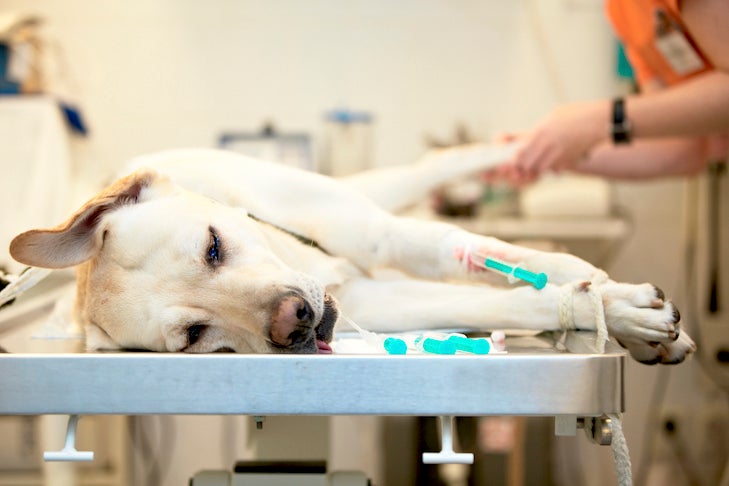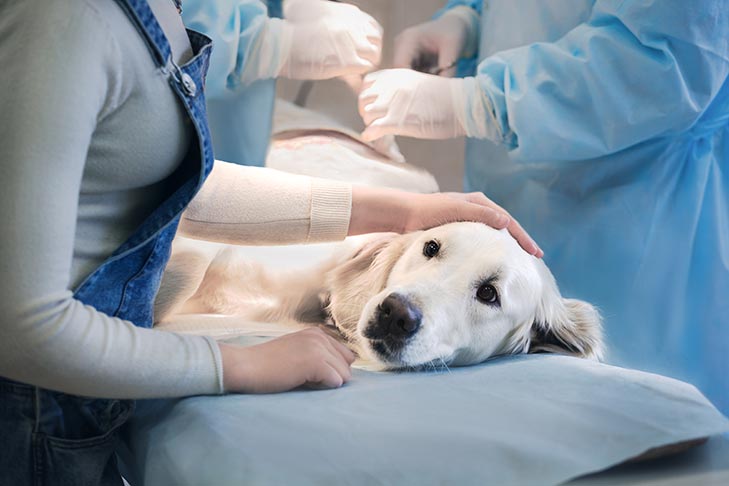AKC is a participant in affiliate advertising programs designed to provide a means for sites to earn advertising fees by advertising and linking to akc.org. If you purchase a product through this article, we may receive a portion of the sale.
Thyroid disease in dogs is a relatively common problem. While this condition is usually treatable, learning that your dog has a thyroid condition is understandably concerning.
Here is some information about the more common thyroid diseases that can affect dogs. This way, you’ll have a better understanding of your dog’s condition.
What Does the Thyroid Do?
In order to understand thyroid disease, it helps to have an understanding of what the thyroid actually does. The thyroid gland is located in your dog’s neck, where it produces thyroid hormones including thyroxine (T4), along with several other important thyroid hormones.
The thyroid is like the thermostat of the body. It regulates different internal systems by sending the appropriate amounts of hormones to necessary places. In particular, the hormones play a large role in your dog’s metabolism. When they’re not produced at normal levels, major health issues can result.
Hypothyroidism in Dogs
Hypothyroidism occurs when your dog is not secreting enough thyroid hormones, causing your dog’s metabolism to slow. Low thyroid levels affect all your dog’s organs. In 95% of cases, the direct destruction of the thyroid gland causes hypothyroidism.
The symptoms of hypothyroidism can vary greatly from dog to dog but are all mostly related to your dog’s slowing metabolism. Your veterinarian will diagnose your dog based on clinical signs and careful diagnostic testing. This will probably require several blood tests to determine if your dog exhibits any of the abnormalities commonly associated with the disease, and regular monitoring of your dog’s thyroid levels.

Hypothyroidism is treatable. Your veterinarian will probably give your dog a prescription for thyroxine, a replacement hormone compound, to offset your dog’s low thyroid function.
Hyperthyroidism in Dogs
Hyperthyroidism occurs when your dog’s body produces too much of the thyroid hormone, increasing your dog’s metabolic rate to dangerous levels. This disease is rare in dogs, but when it does appear, it’s usually serious. The symptoms of hyperthyroidism in dogs may vary, ranging from increase appetite and thirst to shortness of breath and an increased heart rate.
A cancer called thyroid carcinoma is the primary cause of hyperthyroidism in dogs. Once they diagnose your dog, your veterinarian will discuss treatment options and prognosis. These options will depend on the stage of the cancer, the size of the tumor, and the extent of nearby tissue involvement.
Your veterinarian may recommend surgery, chemotherapy, or radiation treatments, depending on your dog’s condition. In the meantime, there are medications available to counteract the excess hormone levels to keep your dog comfortable.
Unfortunately, the long-term prognosis for dogs with hyperthyroidism and thyroid carcinoma is poor to grave. Talk with your veterinarian about your dog’s condition for the most accurate prognosis.
Goiters in Dogs
Not all thyroid enlargement is necessarily cancerous. In some cases, a thyroid enlargement, called a “goiter,” could the result of another problem entirely.
Goiters can affect all domestic mammals and birds. They can be caused by too much or too little iodine in a diet, and inherited defects that affect the synthesis of thyroid hormones. They can also be caused by eating goitrogenic substances, which are foods or other substances that affect thyroid function, like lima beans and sweet potato.

Luckily, dietary imbalances are rare in dogs fed a commercial diet. Most goiters in dogs are caused by genetic defects. They can also develop as a side effect of administration of trimethoprim-sulfa, an antibiotic used to treat a variety of infections in dogs, according to veterinarians.
Goiters can be a symptom of congenital hypothyroidism, meaning a dog has hypothyroidism from the time they’re born. Toy Fox Terriers, in particular, appear to be predisposed to congenital hypothyroidism with goiters.
Goiters often appear more alarming than they are. However, any swelling on your dog’s neck should be taken seriously. If you suspect your dog has a goiter, or if you find swelling in your dog’s neck, contact your veterinarian as soon as possible.
Autoimmune Thyroiditis in Dogs
Some breeds of dogs, like the Akita, Doberman Pinscher, Beagle, and Golden Retriever, may be predisposed to a type of thyroid disease called autoimmune thyroiditis. This disease occurs when the immune system attacks the thyroid gland.
Hypothyroidism can be a sign of autoimmune thyroiditis. However, autoimmune thyroiditis can also be a symptom of other disorders, such as systemic lupus erythematosus. This is one of the reasons why getting an accurate diagnosis for hypothyroidism is so important.
What to Do if You Think Your Dog Has a Thyroid Issue
Thyroid issues in dogs require medical treatment from a veterinarian. Make an appointment with your veterinarian if your dog is showing symptoms of thyroid disease. Though the symptoms can very greatly and depend on the dog, but if your dog is experiencing increased appetite or heart rate, or seem to have shortness of breath, it’s worth checking in with your vet. Not all of these symptoms directly point to thyroid issues in dogs, but it’s better to be safe when it comes to your dog’s health.
This article is intended solely as general guidance, and does not constitute health or other professional advice. Individual situations and applicable laws vary by jurisdiction, and you are encouraged to obtain appropriate advice from qualified professionals in the applicable jurisdictions. We make no representations or warranties concerning any course of action taken by any person following or otherwise using the information offered or provided in this article, including any such information associated with and provided in connection with third-party products, and we will not be liable for any direct, indirect, consequential, special, exemplary or other damages that may result, including but not limited to economic loss, injury, illness or death.

